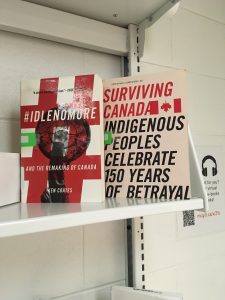On September 20th, Lower Field will play host to the 19th Annual McGill Pow Wow, a full day of traditional dancing and drumming. The Pow Wow is only one of many exciting events happening during Indigenous Awareness Weeks, in its 9th year, which run from September 16th to the 27th. In honour of, and in collaboration with, IAW, the Humanities and Social Sciences library has mounted a book display in the Redpath Library Building. The books on display cover a wide variety of subjects as they present a celebration of Indigenous heritage, resistance, love and literature.
First Nations and Inuit from across Canada are represented, including books by Two-Spirit authors Lindsay Nixon, Arielle Twist and Smokii Sumac, who will be reading from their works on September 18th.
Sobering reads on topics such as the Inquiry into Missing and Murdered Indigenous Women, the legacy of residential schools and ongoing resistance to colonialism are offset by exultant reads honouring Indigenous spirit, resilience and ingénue.

Reclaiming power and place : the final report of the National Inquiry into Missing and Murdered Indigenous Women and Girls.
- Secret Path, by Gord Downie and Jeff Lemire. “Downie and Lemire have done something brilliant here by bringing the story of Chanie Wenjack and the residential school system to light for the reading public. Secret Path is a brilliant book, which should be held in prominence on any bookshelf. It breeds empathy and creates thought and discussion which, no doubt, will lead to action on improving an injustice to the human condition.”
- Surviving Canada: Indigenous Peoples Celebrate 150 Years of Betrayal, edited by Kiera L. Ladner and Myra Tait, is “a collection of elegant, thoughtful, and powerful reflections about Indigenous Peoples’ complicated, and often frustrating, relationship with Canada, and how-even 150 years after Confederation-the fight for recognition of their treaty and Aboriginal rights continues. Through essays, art, and literature, Surviving Canada examines the struggle for Indigenous Peoples to celebrate their cultures and exercise their right to control their own economic development, lands, water, and lives. The Indian Act, Idle No More, and the legacy of residential schools are just a few of the topics covered by a wide range of elders, scholars, artists, and activists. Contributors include Mary Eberts, Buffy Sainte-Marie, and Leroy Little Bear.”
- Me Artsy, by Drew Hayden Taylor, “an exploration and deconstruction of the Aboriginal artistic spirit as seen and practiced through various art forms that demonstrate reflections on society through an indigenous perspective, including talents not just limited to those considered strictly traditional in origin, but inclusive of more contemporary forms of cultural expression.”
- Love Beyond Body, Space and Time, edited by Hope Nicholson, is “an anthology of science fiction and urban fantasy stories starring First Nations and Metis characters with a LGBT and two-spirit theme.”
- Reawakening Our Ancestors’ Lines, by Angela Hovak Johnston, follows “what was at first a personal quest became a project to bring the art of traditional tattooing back to Inuit women across Nunavut, starting with Johnston’s home community of Kugluktuk. Collected in this beautiful book are moving photos and stories from more than two dozen women who participated in Johnston’s project. Together, these women have united to bring to life an ancient tradition, reawakening their ancestors’ lines and sharing this knowledge with future generations.”

“Reawakening our ancestors’ lines : revitalizing Inuit traditional tattooing,” by Angela Hovak Johnston
Check out a book and discover for yourself the breadth and depth of Indigenous knowledge, love, and spirit.
McGill University is located on land which has long served as a site of meeting and exchange amongst Indigenous peoples, including the Haudenosaunee and Anishinabeg nations. McGill honours, recognizes and respects these nations as the traditional stewards of the lands and waters on which we meet today.
/
L’Université McGill est sur un emplacement qui a longtemps servi de lieu de rencontre et d’échange entre les peuples autochtones, y compris les nations Haudenosaunee et Anishinabeg. McGill honore, reconnaît et respecte ces nations à titre d’intendant traditionnel des terres et de l’eau sur lesquelles nous nous réunissions aujourd’hui.
Learn more about the vibrant community of Kahnawà:ke: http://kahnawaketourism.com/
Learn about the Hochelaga Rock: http://www.historicplaces.ca/en/rep-reg/place-lieu.aspx?id=12017
Do you know how many Nations are in Quebec? http://www.autochtones.gouv.qc.ca/nations/cartes/carte-8×11.pdf





